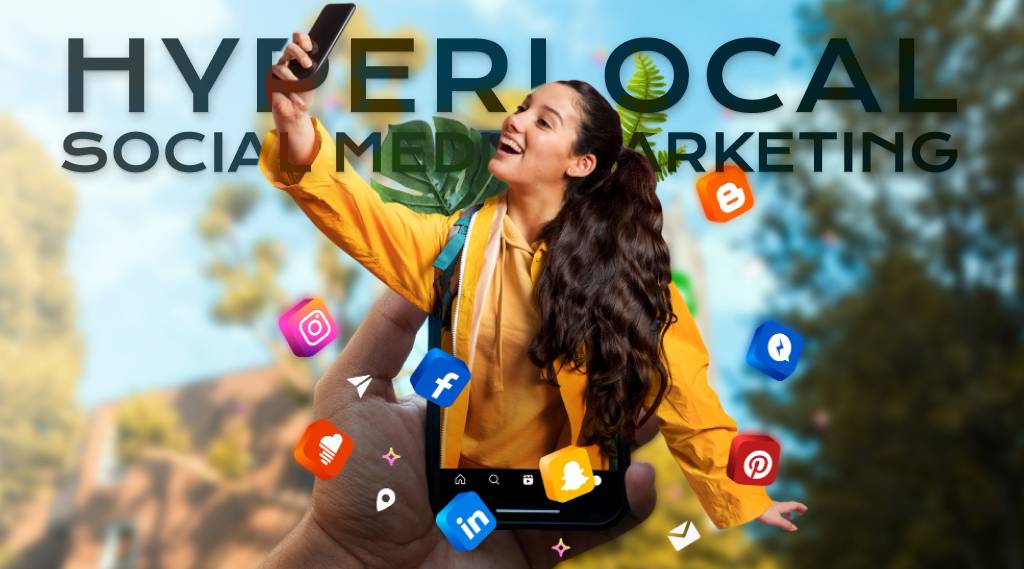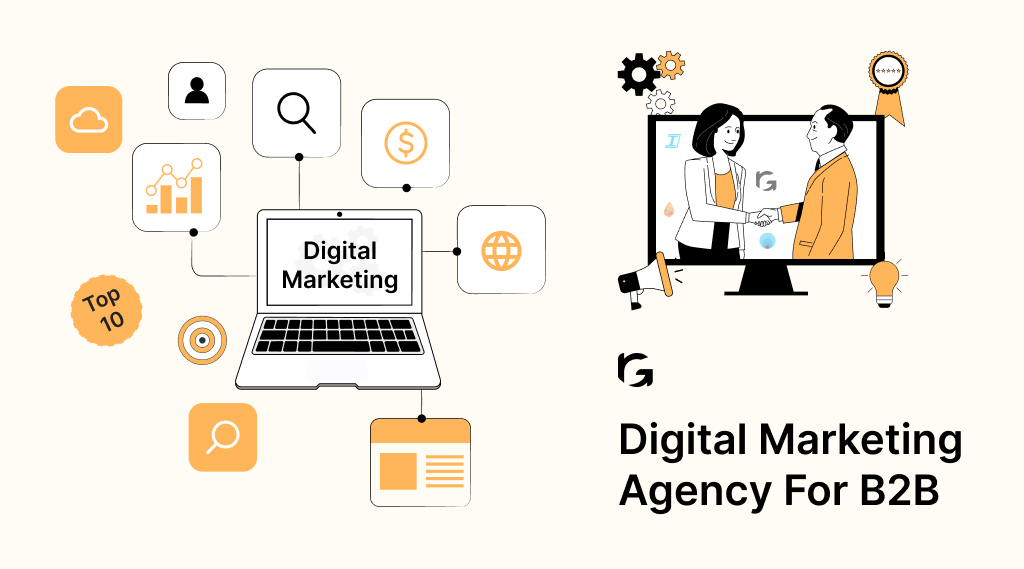Introduction
Social media has become an indispensable tool for businesses looking to connect with their target audiences. And in 2024, the focus is shifting towards hyperlocal marketing – the practice of targeting potential customers in a specific, localized area.
In this blog, we’ll explore the latest trends and strategies in hyperlocal social media marketing that can help businesses thrive in 2024. From leveraging the power of geotargeting to creating personalized content for local audiences, we’ll uncover the secrets to success in this rapidly evolving landscape.
Join us as we delve into the world of hyperlocal social media marketing and discover how you can harness its potential to take your business to new heights in 2024 and beyond.
What is hyperlocal social marketing?
Hyperlocal social media marketing is a strategy that focuses on reaching people in a specific area, like a neighborhood or city, using social media. It involves creating tailored content for local audiences and using tools to target people based on their location. The goal is to engage with customers in the local community and drive more people to physical stores or locations.
What Are the benefits of hyperlocal social media marketing?
Hyperlocal social media marketing is all about connecting with your local community through social media. It’s a powerful way for small businesses to build relationships, increase engagement, and drive more sales. Here are some key benefits:
1. Building a community connection:
Hyperlocal marketing allows businesses to shine a spotlight on local landmarks, fellow businesses, and community events. By integrating into the daily life of the community, businesses can establish a solid bond of trust and connection. This strategy also opens up opportunities for collaborations and partnerships with nearby businesses, contributing to expansion and growth.
2. Increased engagement:
Engaging customers in a more personal, local context helps build relationships beyond sales. This approach fosters trust and loyalty, leading to higher engagement rates. By aligning with local values and interests, businesses can resonate more deeply with their audience.
3. Higher conversion rates:
By targeting a specific geographic area and tailoring content to local preferences, businesses can speak directly to an audience that is more likely to be interested in their products or services. This targeted approach often leads to higher conversion rates.
4. Lower advertising costs:
Hyperlocal marketing allows businesses to target the right audience at the right time, using local hashtags, geotags, and leveraging user-generated content. This targeted approach ensures that businesses get better ROI from their advertising dollars.
5. Enhanced customer engagement:
Engaging with the local audience on a personal level helps build strong relationships and brand loyalty. Customers who feel connected to a brand are more likely to become repeat customers and brand advocates.
6. Increased foot traffic for brick-and-mortar businesses:
For businesses with physical stores, hyperlocal marketing can drive more foot traffic to their locations by targeting users nearby.
7. Better relevance and personalization:
Tailoring content to local preferences and cultural nuances makes a brand more relatable and appealing to the local audience. This approach demonstrates an understanding of and respect for the local identity, which can strengthen brand loyalty.
8. Local community building:
By building a sense of community and trust, businesses can encourage customers to talk about their brand, share their experiences, and generate word-of-mouth marketing.
9. Establishing authority:
Positioning a business as a leading provider in a specific area, especially by leveraging local influencers, helps build reputation and establish the brand as a trusted name in the community.
10. Attracting a highly-relevant audience:
Targeting a hyperlocal audience means reaching people who are not only interested in the products or services offered but also conveniently located near the business. This can lead to a more loyal customer base.
11. Engaging with community:
Participating in local events or supporting local causes helps businesses embed their brand in the local culture and build a loyal following.
12. Scalability:
Hyperlocal marketing can serve as a pilot test for broader campaigns. Success in one area can be replicated in other areas, reducing the risk of failure and enabling a more strategic approach to scaling marketing efforts.”
This version provides a more detailed explanation of the benefits of hyperlocal social media marketing, highlighting the importance of this strategy for businesses looking to connect with their local communities.
How to approach the hyperlocal social media marketing framework?
Crafting an effective hyperlocal social media marketing framework requires a meticulous blend of strategy, creativity, and adaptability. Here’s a comprehensive guide on how to approach this framework for optimal success in 2024:
1. Define Your hyperlocal persona:
Start by creating detailed personas for your hyperlocal audience. Understand their demographics, interests, and pain points. Consider local nuances, cultural preferences, and even linguistic peculiarities. This deep understanding will serve as the foundation for creating content that truly resonates.
2. Localize your content strategy:
Tailor your content to reflect the unique aspects of the local community. Highlight local events, traditions, and landmarks. Use colloquial language and references that locals can relate to. Showcase your business’s involvement in community activities to position yourself as an integral part of the local fabric.
3. Leverage geotargeting:
Take advantage of geo targeting features on social media platforms. This allows you to reach users based on their location, ensuring that your messages are delivered to the right audience. Geo Targeted ads and posts enhance the relevance of your content and increase the chances of engagement.
4. Engage in local conversations:
Actively participate in local conversations on social media. Monitor relevant hashtags, join local groups, and respond to comments and mentions. This not only increases your visibility but also establishes your brand as approachable and community-centric.
5. Collaborate with local influencers:
Identify and collaborate with influencers or thought leaders within your target locality. Influencers often have a strong local following, and their endorsement can significantly boost your brand’s credibility. Ensure that the influencers you partner with align with your brand values and resonate with your target audience.
6. Create location-specific campaigns:
Develop campaigns that are specific to the geographic area you are targeting. Whether it’s a special promotion, event, or product line, make it relevant to the local community. Consider incorporating user-generated content from local customers to further emphasize the connection.
7. Optimize for local SEO:
Optimize your online presence for local search. Ensure that your business information is accurate and up-to-date on platforms like Google My Business. Use location-specific keywords in your content, and encourage customers to leave local reviews. Local SEO plays a crucial role in ensuring that your business is discoverable within the community.
8. Measure and analyze local metrics:
Establish key performance indicators (KPIs) specific to your hyperlocal objectives. Track metrics such as engagement from local users, foot traffic to physical locations, and conversions from local campaigns. Regularly analyze these metrics to refine your strategies based on what works best for your specific hyperlocal audience.
9. Stay agile and adaptive:
The local landscape can change rapidly. Stay agile and adaptive to evolving trends and community dynamics. Regularly reassess your hyperlocal strategy based on feedback, market shifts, and emerging opportunities. Flexibility is key to maintaining relevance in the hyperlocal space.
10. Integrate offline and online efforts:
Forge a seamless connection between your online and offline presence. Use social media to promote in-store events, and vice versa. Encourage online engagement that translates into physical visits. This integrated approach strengthens the bond between your brand and the local community.
By adopting this comprehensive framework, businesses can navigate the intricacies of hyperlocal social media marketing with confidence. Remember, success in the hyperlocal space is not just about transactions; it’s about building lasting relationships that contribute to the vibrant tapestry of the local community.
Who should utilize hyperlocal social media marketing?
To understand who can benefit most from hyperlocal social media marketing, consider this: 69 percent of digital traffic originates from organic and local searches, with 22 percent solely from local traffic. If your business isn’t leveraging hyperlocal social media marketing, you’re missing a significant opportunity.
Prime candidates for hyperlocal social media marketing include:
1. Local Stores: If you have a physical shop, hyperlocal marketing can help bring in customers who are nearby and looking for what you offer.
2. Small Businesses: Especially useful for small businesses trying to become well-known in their local area. It helps you connect with people who might become regular customers.
3. Service Providers: If you provide a service, like plumbing or catering, in a specific area, hyperlocal marketing can make sure people in that area know about you.
4. Businesses During Local Events: When there’s a festival or event happening nearby, hyperlocal marketing can help you take advantage of the increased activity to get more sales and be seen by more people.
5. Any Business Targeting a Local Audience: Hyperlocal marketing is great for reaching people in your area who are more likely to be interested in your products or services.
5 Key strategies for effective hyperlocal social media marketing
To execute an effective hyperlocal social media marketing campaign in 2024, businesses need to adopt strategic approaches that resonate with their local audience. Here are five key strategies for success:
1. Deep audience understanding:
Before crafting any hyperlocal campaign, invest time in understanding the intricacies of your local audience. Analyze demographics, interests, and behaviors specific to the region. This detailed understanding will serve as the foundation for personalized and relevant content.
Action Steps:
- Conduct surveys or polls to gather local preferences.
- Analyze social media analytics for location-specific insights.
- Engage with the local community online to understand their needs.
2. Leverage local influencers:
Collaborate with influencers who have a strong presence in your target locality. These influencers can effectively amplify your brand message and lend authenticity to your hyperlocal campaigns.
Action Steps:
- Identify influencers with a genuine connection to the local community.
- Reach out for collaborations that align with your brand values.
- Utilize influencer content across various social media platforms.
3. Geo targeted content and ads:
Utilize geotargeting features on social media platforms to tailor your content and advertisements to specific locations. This ensures that your messages are highly relevant to the local audience.
Action Steps:
- Create geo targeted posts highlighting local events or promotions.
- Run location-specific ads to boost visibility among local users.
- Use location-based hashtags to enhance discoverability.
4. Community engagement initiatives:
Actively engage with the local community through social media. Foster two-way communication by responding to comments, participating in discussions, and showcasing your involvement in local events.
Action Steps:
- Regularly monitor and respond to comments and mentions.
- Join local groups and forums to stay connected with the community.
- Feature user-generated content that highlights local experiences.
5. Localized campaigns and partnerships:
Develop campaigns and partnerships that directly resonate with the local culture and context. This could involve sponsoring local events, creating promotions tied to regional festivities, or collaborating with other local businesses.
Action Steps:
- Design campaigns that align with local holidays or traditions.
- Collaborate with nearby businesses for joint promotions or events.
- Showcase your commitment to the local community through CSR initiatives.
By integrating these strategies into your hyperlocal social media marketing approach, you can create a robust and authentic presence within your local community. Remember, the key is to build relationships, understand local dynamics, and demonstrate a genuine commitment to the unique needs and interests of the people you aim to serve.
5 Challenges of hyperlocal social media marketing
While hyperlocal social media marketing offers numerous benefits, it also comes with its fair share of challenges. Recognizing and addressing these challenges is crucial for businesses aiming to successfully navigate the hyperlocal landscape. Here are five challenges of hyperlocal social media marketing:
1. Limited scalability:
Hyperlocal strategies are, by nature, focused on a specific geographic area. While this specificity enhances relevance, it also limits scalability. Businesses may find it challenging to replicate hyperlocal success on a broader scale, especially if they operate in multiple regions with unique characteristics.
2. Maintaining consistency across locations:
For businesses with multiple locations, maintaining a consistent brand image and message across different hyperlocal campaigns can be challenging. Ensuring that each location’s content aligns with the overall brand while catering to local nuances requires careful coordination and strategy.
3. Data privacy concerns:
Hyperlocal marketing often involves collecting and utilizing location data. However, increasing concerns about data privacy and regulations can pose challenges. Businesses must navigate these concerns carefully to maintain trust with their audience while still leveraging the benefits of hyperlocal targeting.
4. Adapting to rapid local changes:
Local trends, preferences, and even demographics can change rapidly. Businesses engaging in hyperlocal marketing must stay agile and adapt quickly to these changes. Failing to do so can result in outdated strategies that no longer resonate with the evolving local audience.
5. Resource intensity:
Implementing effective hyperlocal strategies requires dedicated resources, both in terms of time and personnel. Crafting location-specific content, engaging with local communities, and monitoring local trends demand a significant investment. Small businesses with limited resources may find it challenging to maintain a consistent hyperlocal presence.
While these challenges exist, they are not insurmountable. Businesses that proactively address these issues, stay informed about local dynamics, and maintain a flexible approach can successfully navigate the complexities of hyperlocal social media marketing.
Conclusion
Hyperlocal social media marketing is a powerful strategy that can benefit a wide range of businesses, from local stores to service providers and small businesses. By focusing on connecting with the local community, businesses can enhance their visibility, build strong relationships with customers, and drive more foot traffic to their physical locations.
With the increasing importance of local searches and the potential for higher engagement and conversion rates, hyperlocal marketing is a must-try for any business looking to make a meaningful impact in their local area.
Ready to elevate your business with hyperlocal social media marketing? Check this out to start attracting the right people to you. Uncover the strategies that will not only boost your online visibility but also establish your brand as an integral part of your local community. Let’s embark on a journey of innovation and community building. Click here to master hyperlocal marketing now!


